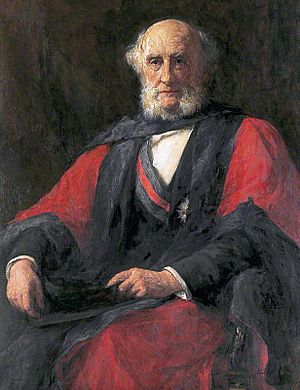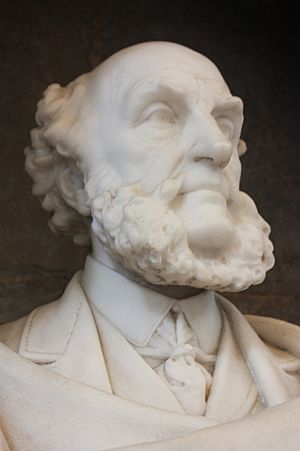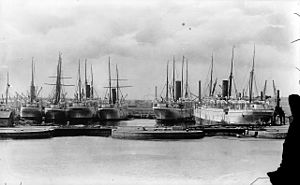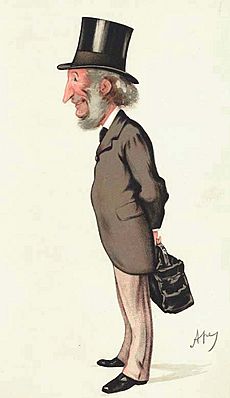Donald Currie facts for kids
Quick facts for kids
Sir Donald Currie
|
|
|---|---|

Donald Currie (Walter William Ouless, 1907)
|
|
| Born | 17 September 1825 |
| Died | 13 April 1909 (aged 83) London, England, United Kingdom
|
| Nationality | Scottish |
| Citizenship | British |
| Occupation | Shipowner, politician, philanthropist |
| Known for | Union-Castle Line |

Sir Donald Currie (born September 17, 1825 – died April 13, 1909) was an important Scottish businessman who owned many ships. He was also a politician and gave a lot of money to good causes.
Contents
Early Life and His Start in Shipping
Donald Currie was born in Greenock, Scotland, on September 17, 1825. He was one of ten children. When he was young, his family moved to Belfast, where he went to school.
Even as a boy, Donald was very interested in the sea and ships. At just 14 years old, he started working in a shipping office in Greenock. After four years, in 1844, he joined the Cunard Steamship Company in Liverpool. This company had some of the first regular steamship lines between Europe and America.
Donald quickly became the head of Cunard's cargo department. He helped the company open new offices in places like Le Havre and Paris in France, and also in Germany and Belgium. By 1854, he returned to Liverpool, having gained a lot of experience.
In 1862, Donald decided to start his own shipping business, which he called the 'Castle' company. At first, it used sailing ships to carry goods between Liverpool and Calcutta in India. He was one of the first to make sailing ships leave on a regular schedule, which was a big deal back then. In 1865, he moved his main office to London.
Building the Union-Castle Line

Donald Currie's 'Castle' shipping line grew steadily. He decided to start a new steamship service from the United Kingdom to Cape Town in South Africa. The first ship, the Iceland, began its journey on January 23, 1872.
At that time, another company called the Union Steamship Company handled most of the trade and mail service between the UK and South Africa. In 1876, the government in Cape Town decided to split the mail service equally between the old Union Company and Donald's new Castle line.
This led to a lot of competition between the two companies. They both worked hard to make their shipping services faster and more efficient. Eventually, in 1900, the two companies joined together to form the Union-Castle Mail Steamship Company. Donald Currie's company managed this new, larger business.
Before Donald Currie passed away, the Union-Castle fleet had 47 steamships. These ships greatly improved travel and trade between the United Kingdom and South Africa. Donald Currie became a respected expert on shipping matters. He helped make important changes to shipping laws in 1876.
Helping in South Africa and British Politics
Donald Currie knew a lot about South Africa, and this knowledge was often helpful to the British government. For example, in 1875, he helped with talks about the diamond fields in Kimberley. He helped set the boundaries and agreements for this important area.
In 1879, Donald Currie's ships helped deliver the first news of a big battle during the Zulu war. At that time, there was no telegraphic connection between the UK and South Africa. The news was sent by a Castle ship to another location, then telegraphed to Currie in London. Within two days, one of his ships was already on its way to South Africa with more soldiers.
Later, in 1883, because of Donald Currie's efforts, the British flag was raised at St. Lucia Bay in Zululand. This stopped another country from taking control of the area.
When the South African war started in 1899, Donald Currie's ships were very important. They carried over 170,000 soldiers to and from South Africa, along with tons of supplies, all without any accidents. He even helped arrange for two important generals, Lord Roberts and Lord Kitchener, to meet up and travel together to South Africa.
Serving in Parliament
In 1880, Donald Currie became a member of the British Parliament, representing Perthshire in Scotland. He was part of the Liberal Party. He held this seat until 1885.
Later, he represented West Perthshire from 1886 until he retired from Parliament in 1900. Even though he changed political parties, he remained good friends with the Prime Minister, William Gladstone. Gladstone and other important people often joined Donald Currie on summer cruises aboard his ships.
Landowner and Supporter of Communities
In 1880, Donald Currie bought a large estate called Garth in Scotland. Over the years, he bought more land, including the Glen Lyon estate and Chesthill. He also bought several islands off the coast of Scotland, like Scalpay.
Donald Currie was a very kind landlord to the people living on his properties. He brought in new types of farm animals and spent a lot of money to build and improve churches, schools, and homes. He also enjoyed hunting and fishing on his lands.
Giving Back: Philanthropy
In his later years, Donald Currie gave away a lot of money to help others.
- In 1904, he gave £80,000 to University College Hospital in London for a medical school. He also gave £20,000 for a nurses' home.
- He gave £25,000 to the University of Edinburgh for a special lecture fund and £6,000 to make the Students' Union bigger.
- He also gave money to churches, especially the United Free Church of Scotland.
- He paid a lot to restore the choir of Dunkeld Cathedral.
- He was especially generous to Belfast, where he spent his childhood. He gave £20,000 to Queen's College, which now has 'The Donald Currie Laboratories'. He also helped pay for an athletic field for students.
- He set up scholarships at his old schools, Belfast Royal Academy and Royal Belfast Academical Institution.
Sir Donald Currie died on April 13, 1909, and was buried near his home in the Scottish Highlands.
Family Life
Donald Currie married Margaret Miller in 1851. She outlived him. They had three daughters. To honor their father, his daughters paid £25,000 to build a university hall at the University of Cape Town in South Africa.
Donald's brother, James Currie, also owned a shipping company called the Currie Line. Donald's nephew, James Currie, was a well-known expert in minerals and plants.
Awards and Recognition
Donald Currie received many honors during his life:
- In 1880, he won the Fothergill gold medal for improving passenger steamers.
- In 1881, he was made a C.M.G., and in 1897, a G.C.M.G. These are special honors from the British Crown.
- In 1906, he received an honorary degree from the University of Edinburgh.
- He was also given the Freedom of the City of Belfast, which is a special honor from the city where he grew up.
See also
- Currie Cup
- Old Castle Swifts F.C.
- Union-Castle Line


